- Home
- Julian May
Sagittarius Whorl Page 18
Sagittarius Whorl Read online
Page 18
The captain's hooded blue eyes looked away. "Ach, it's a political thing, you know? Anyone who speaks of it..." He trailed off, shaking his head.
"How long have Haluk bandits been attacking Sheltok ships?"
But he was too shrewd to fall into my clumsy trap. "I know what you're trying to do," he growled. "You think you'll sell my admission to the web-tabloid muckrakers. Wouldn't they pay a pretty penny for a sensational story like this! Well, you won't get any more out of me, whoever the hell you are. What good is it to be rescued from killer pirates if one ends up Thrown Away for corporate disloyalty, eh? Answer me that!"
"If criminal behavior by the Haluk is brought into the open, they can be pressured to cease and desist. You could avenge the other victims and prevent—"
He interrupted me with a scornful laugh. "I thought before that you were a fool, Hugo. Now I know it for a fact. Sheltok will stamp out these Haluk vermin and their renegade Y'tata confederates without having its affairs smeared across the filthy media. Meanwhile, the situation must be kept under wraps so as not to undermine public confidence in the Concern. Do you understand?"
"I only want to help."
He suddenly sounded very tired. "Then call Lethe on your subspace communicator and ask them to send a tug for us. Send it soon, Hugo. Eblis out."
The viewer went dark. And that was that.
I did as Schmidt asked, in a roundabout fashion. As I resumed my interrupted voyage, I contacted Karl Nazarian on the SS com and fed him the recorded information I'd gathered on the pirate attack.
"Sixteen Haluk bandits attacking one bulk carrier?" he marveled. "Good grief. It almost sounds as though your war has already started."
"Pass this fresh intelligence along to Ef Sontag. Then find a way to anonymously relay Eblis's request for a tug to Shel-tok Tower. Their external security people will take it seriously if they're given the coordinates of the derelict."
"What about informing Zone Patrol?"
"Don't bother. The report would only be suppressed. The carrier captain let slip that Haluk attacks are common out here. Sheltok's just keeping it quiet so as not to rock the consortium applecart ... Do you have any good news for me?"
"Well, there are no demiclones on Sontag's staff or in his family. Hector and Cassius are skulking around the Assembly dining rooms, pinching used water glasses and half-eaten croissants. So far, no Delegates test positive. Lotte has analyzed and recollated all of the Gala secret files. She's working with Sontag's people to mesh the new data with the old. Bea Mangan found six scientists willing to do tissue-culture research with the mystery gene."
"That's great."
"Other news: Simon nominated Gunter Eckert to be the new Rampart chairman and John Ellington to be VC. The board will vote when Eve returns from the Spur next week. Not a trace of your brother Dan. However, one of the injured guards recovered enough to help InSec make up computer-model images of three of Dan's abductors. Let me show them to you. I think you'll find them interesting."
Three male faces, side by side, flashed onto the com display. Two of the men were totally nondescript; but there was something disturbingly familiar about the third, and I felt a sudden dry sensation in my throat.
"Karl, is it my imagination, or does the guy in the middle look a little like Alistair Drummond? Remove the mustache, add more flesh to the cheeks, and lose the eye bags, give him a designer haircut..."
"The resemblance isn't very close, but I spotted it, too."
"Drummond and the Haluk!? The aliens washed their hands of him—all but betrayed him to us!"
"Yes," said Karl. "The resemblance is probably coincidental. But I wanted to show it to you anyhow. Give you some food for thought."
"Thanks all to hell," I grumbled. "Anything else?"
"The weather in Toronto is sensational—twenty-three degrees celsius, bright sunshine, balmy spring breezes. The Conurb Council turned off the force-field umbrella for the first time this year."
"Wish I was there."
"No, you don't," said Karl Nazarian.
He bid me goodbye and I resumed my interrupted journey to Phlegethon. A day or so later I arrived at the asteroid without further incident.
From space the little world looked like nothing much— perhaps a pitted and decaying pumpkin, dull orange-black in color, with a handful of tiny orbiting craft floating around it like fruit flies. Here and there amber lights shone out of craters in the surface. What seemed to be scores of deformed silver minnows nibbling the pumpkin rind—together with numbers of smaller noshmates—were actually huge transac-tinide carriers and lesser starships, either taking on fuel or docked nose-to-ground while their crews rested and recreated inside the not so heavenly body.
I have been told that the original Phlegethon of Greek mythology was a fiery river in Hades. Sheltok Concern owned a dozen or so similar way stations with brimstony names—Gehenna, Styx, Sheol, Tophet, Avernus, Niflheim, and the like—that served vessels bound to or from the terrible R-class worlds where ultraheavy elements are mined. Compared to the genuine inferno of the Sagittarian arm of the Milky Way—nearly lifeless, seething with deadly gamma and x-radiation blasted out from the galactic hub, clogged by colossal interstellar dust clouds and minefields of cosmic debris, and infested with malignant little black holes and the weird oscillating novae that generate stable transactinide elements—dreary Phlegethon was a Garden of Eden.
My computer told me that the asteroid was only 163 kilometers in diameter. It followed a distant orbit about a melancholy blood-orange sun near the outer margin of the Whorl. The other planets in its solar system were tired gas giants and waterless desert worlds. What made Phlegethon appealing to starfarers was the fact that it was not composed of solid rock or sterile meteoric metal, as are most asteroids. Phleg was a carbonaceous chondrite.
CC's are as common as comets in our galaxy. Most of them are smaller than a bread box, a mixture of iron and magnesium silicates, other minerals, and generous amounts of dihydrogen oxide, plus lots of simple organic compounds—including amino acids, the building blocks of life. Little CC's, falling as meteorites, can seed the oceans of newborn worlds and cook up primordial soup. Large CC's, judiciously carved and riddled, are the best possible interstellar way stations.
Warm one of these lumps up with an internal powerplant to melt the embedded ice, provide light and enough artificial gravity inside so denizens and visitors can walk about in reasonable comfort, crack some of the organic compounds to release nitrogen, oxygen, and carbon dioxide for a breathable atmosphere in the tunnels, and you have an instant space station. Add fertilizing trace elements to the pulverized asteroidal substance and you can build yourself a garden in space, for an asteroidal carbonaceous chondrite is nothing but a big ball of rocky dirt. Carbon-based foodstuffs will grow like mad in an enhanced CC. So will marijuana, magic mushrooms, coca shrubs, dilly beans, pseudopoon, rakka, hebenon, and a host of other recreational narcotic plants. Phlegeton grew those, but it was also noted for its succulent salad veggies, suzyberries, sweet melons, and barley.
Yep, barley. For beer. The place had five microbreweries.
Even though Phlegethon was Sheltok property, it operated as a freesoil world. There were none of the usual arrival formalities when my gig docked at one of the small-craft mooring facilities. I came through the airlock carrying only a locked titanium case hanging at my hip on a baldric. It contained the contents of the Daffy pack and a Hogan H-18 miniaturized low-power psychotronic interrogation device that would enable me to learn whether Barky knew anything at all useful. If he did, I'd take him back to Makebate and attach him to really efficient truth machines for more serious discussion.
I'd be returning regularly to my starship to sleep and get a decent meal. My costume's mask had ports for drinking through a straw and the insertion of small edibles, and Joru readily consumed many kinds of human alcoholic beverages and snack foods; but I wasn't going to give up my favorite rib-stickin' ranch-type vittles for the duration. My other personal needs would be
take care of in the asteroid's public conveniences, omniracial cubicles of the type that are blast-sterilized after every use.
Hidden under my robes was a collection of special equipment that included both a stun-gun and a Kagi blue-ray blaster, restraint cuffs in several sizes, antigravity supporters similar to the ones Black Leather and Brown Fleece had used on me during my abduction, and a projector capable of generating a movable small force-field hemisphere. My flexible body armor would protect me from stun-darts and most types of photon pistols, but I really hoped I wouldn't get into a gunfight. The damned six-digit paws didn't enhance trigger dexterity.
The arrival-departure lobby of Phlegethon was a roughhewn cavern, very well lit, swarming with people of four races. Humans were the most numerous, but there were plenty of Y'tata and Joru. A few groups of ponderous Kalleyni slouched about, giggling and gaping at the goofy-looking humanoid entities.
Gravity in this part of the asteroid was about seven-eighths terrestrial, enough to put a good bounce in your step. The air was chilly, humid, and smelled faintly of formaldehyde, one of the simple organic compounds abundant in the asteroidal substance. A thin mist hung about the light fixtures. I could hear the dull roar of powerful ventilation equipment.
The floor appeared to be wet tarmac, cambered for drainage and punctuated by openings covered by ceramalloy grates. The walls and ceiling, so heavily pocked and cratered that they resembled gritty dark Swiss cheese, were covered by a transparent sealant that had cracked in numerous areas, allowing meltwater and gases to seep through. You could see embedded chunks of dirty ice everywhere. A rat's nest of exposed cables, pipes, and utility ducts decorated the ceiling.
At regular intervals around the chamber perimeter were large tunnels topped with directional signs. They served as pedestrian thoroughfares, or gave access to elevators and the small network of transport capsules. Other openings in the lobby wall, stoppered by glass doors with heavy gaskets, led to Sheltok offices, the better human-style hotels, and the quarters of legitimate trading establishments.
I wasn't interested in the latter.
As I stood in a small alcove studying a holographic map of the place, a young Y'tata sidled up to me. His wrinkled albino skin was an unhealthy gray and the beady red eyes were crusted with matter. He was dressed in light green pants, a long-sleeve green shirt, and a copper-scaled kilt and vest. The garments were typical of a Y starship crew member, but they were shabby and tarnished.
"Hey, Mr. Joru, welcome to Phleg! You maybe need a guide? I'm your main man. Whataya say?" He spoke in Standard English, as aliens are obliged to do on human worlds—at least when humans are likely to be listening. Y'tata translation devices have a snappy command of semi-obsolete English slang.
"Go away," I said shortly. I figured him for a maroony, one of those unfortunate wretches who can be found on almost any galactic way station, dumped off for some infraction of ship's discipline and trying to earn enough credit through odd jobs to get back to their home world. Human and Y maroonies were the most common, although Qastt castaways were coming on strong in the Perseus Spur now that they'd signed a trade treaty with the CHW.
"I'm Sh'muz. Good name for a fast talker, hey? Or doesn't that translate? Ha-ha! I can help you find abso-fuckin'-lutely anything you need. How's about a comfy high-oxygen hotel with nice hard beds? A restaurant with juwulimopsh like your dear old mothers used to cook? Hey, you into sex for hire? Primo dope? Honest Injun gambling?"
I stared haughtily at the entity in the condescending manner of my kind. Joru and Y'tata shared roughly the same region of the inner galaxy, where for over twenty thousand terrestrial years they were the only stargoing Insaps. Their relationship had been one of contemptuous toleration until the advent of the appalling Commonwealth of Human Worlds, with its superior technology and policy of relentless racial aggrandizement. A sense of mutual humiliation had drawn the Joru and Y'tata closer together.
But not too close.
For Y'tata digestive processes generate peculiarly malodorous gases that once served as a useful deterrent to predators on their planet of origin. The effluvia are a rank offense to the sensibilities of the fastidious Joru, whose breathing equipment concentrates oxygen from the ambient atmosphere of exotic worlds and tends to amplify smells as well. On Earth and the larger human colonies, there are laws requiring Y'tata visitors to avert the danger of backfiring by taking special medication; but minor settlements like Phlegethon that make a special effort to attract alien customers tend to be more easygoing. With a little extra effort, your average Y-on-the-street can control himself in most interracial social situations.
Sh'muz was doing his best not to offend, but not really succeeding. I was much taller and probably scary-looking, making the creature nervous.
Maybe it was the olfactory assault that overcame my common sense. At any rate, I committed what eventually proved to be a major blunder. Stepping back a few paces from the worst of the fug, I muttered, "There is only one way in which you might assist me, disgusting noisome entity. Do you know where I might find a human trader named Barney Cornwall?"
Sh'muz blinked his red eyes rapidly, a mannerism indicating both disappointment and despair. "Never heard of the bugger." He perked up. "But I know a Bernie Cohen! Any kinda contraband you wanna buy or sell, Bernie's the guy. I can take you to his burrow in the Bazaar right now."
"Thank you, no." I began to move away.
"Look—I'll ask around, see if anybody ever heard of this Barney Cornwall. Get right back to you. You got a phone code? How about the name of your hotel?"
"No! Begone, obnoxious person!"
Sh'muz had no intention of letting go of a live one. "I'll find the guy for you, trust me. I got contacts! How's about we meet in about ten hours, see what shakes? There's this bar, La Cucaracha Loca, a human joint but all kinda entities welcome. On Level 4, near the heavy-craft refueling bays. Midnight. Whataya say?"
The answer to that one was: Oh, shit. I'd carefully worked out stratagems for introducing Barky Tregarth's alias into conversations with Phlegethon locals, in hopes of luring him to my bait. None of my tactical scenarios included a clown like Sh'muz trumpeting Barney Cornwell's name about the asteroid like some flatulent town crier.
"Please do not exert yourself on my account," I said firmly. "I am not really interested in meeting Trader Cornwall after all. Is that clear? Forget him and forget me!"
"Aww ..." Utter dejection. The pathetic Y'tata maroony was probably counting on the tip for eating money.
I opened a pouch in my baldric, extracted a human hundred-dollar bill, and handed it over. "Please leave me alone. Here is a little something to tide you over until you find another client to guide."
The Y'tata's eyes blazed like the taillights of a BMW as he registered appreciation.
"Hey—thanks a bunch, Mr. Joru! You're a prince. Or prime minister. Or whatever! I'll find Cornwall if I hafta tear this orbiting garbage heap apart. Don't forget! Cucaracha Loca. Twenty-five hundred hours. Be there!"
He dashed away into the crowd, leaving me cursing in a miasma.
I got on an elevator and headed down.
The uppermost levels of Phlegethon were devoted to fuel storage areas, starship repair shops, Sheltok offices, and traveler amenities. Below were situated enormous ultrase-cure warehouse caverns, many with access tunnels opening to the surface, labeled only with anonymous alphanumerics. Some of the merchandise locked inside might have been legitimate trade goods; a larger percentage was undocumented contraband. Sheltok's port officials didn't care what went into and out of the storerooms; they simply charged extortionate rent and collected stiff entrance and exit fees on every transshipment.
Beneath the storage levels the elevator passed farm galleries lit by dazzling vapor lights, alternating with blocks of environmental utilities. In the denser core of the asteroid, where embedded ice and volatile organic chemicals were at a minimum, were apartment warrens for the permanent inhabitants and the catacombs where shady traders
congregated.
The more prosperous of these hucksters conducted business in an area called the Bazaar, on Level 32. Here hundreds of chambers had been carved out of the asteroid's interior substance. Some were no-frill holes in the wall that bordered on the squalid, wide open to passersby, crude excavations fitted out with desks, computers, com equipment, and a few stools. Others, with sample merchandise on display, were fully enclosed and as elaborately tarted up as the small retail stores in Toronto's Underground Path. Both kinds of outfits were swarming with customers.
A directory, divided into categories, was posted next to the elevator. I consulted it and made a list of arms traders. There were over a dozen of them, peddling everything from Kalleynian ceremonial tail-sabres to antimatter torpedoes. Since guns and materiel had been Barky Tregarth's area of expertise in the Perseus Spur, I hoped he was still in the same game here in the Sag. It would certainly fit neatly with his interest in the Haluk.
I visited each merchant of death in turn, beginning with the humans. Most of them brushed me off almost immediately when they discovered the esoteric nature of my trade goods. To those who showed an interest, I delivered my spiel, which went something like this:
merchant of death: What you want? I'm a busy man, Joru, so make it quick. None of your damned time-wasting yackety-yak.
helly as joru: I have some extremely valuable merchandise on offer, of a most unusual nature. It does not readily fit into any category listed in the Bazaar directory; but since the material has a certain strategic value, I wish to sound out your interest.
mod: Extremely valuable? ...
haj: [Taking a single small biocontainer out of his baldric case while simultaneously allowing his sleeve to fall back, revealing an arm holster containing a Kagi pistol with a glowing ready-light] Allow me to open this refrigerated cylinder. Ah—there! The contents are a genetic engineering viral vector known as PD32:C2.
mod: Never heard of it. And I don't deal in biological warfare items. Get lost.

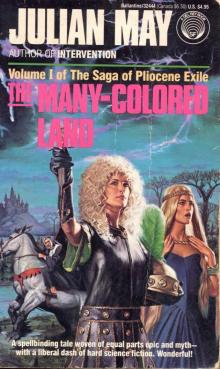 The Many-Coloured Land
The Many-Coloured Land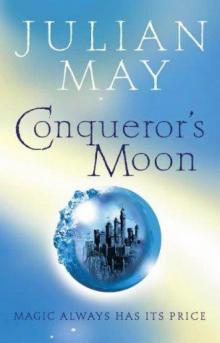 Conqueror's Moon
Conqueror's Moon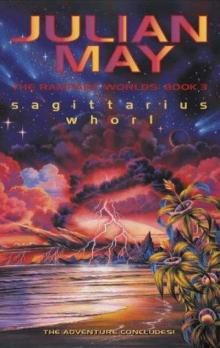 The Sagittarius Whorl
The Sagittarius Whorl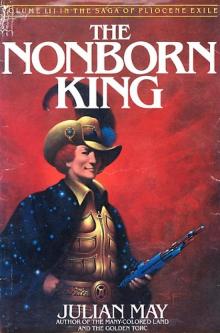 The Nonborn King
The Nonborn King Sky Trillium
Sky Trillium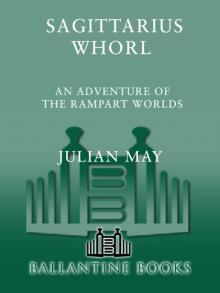 The Sagittarius Whorl: Book Three of the Rampart Worlds Trilogy
The Sagittarius Whorl: Book Three of the Rampart Worlds Trilogy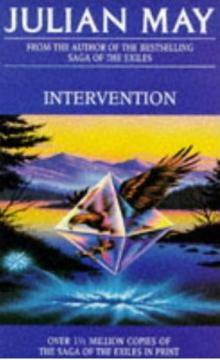 Intervention
Intervention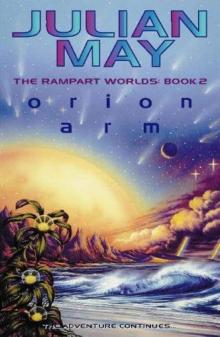 Orion Arm
Orion Arm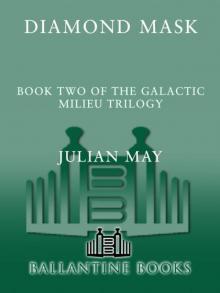 Diamond Mask
Diamond Mask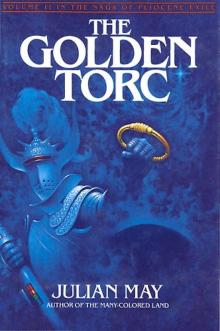 The Golden Torc
The Golden Torc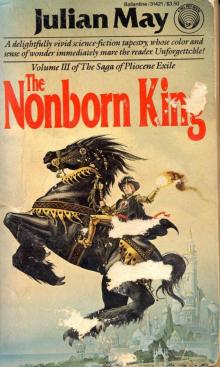 The Noborn King
The Noborn King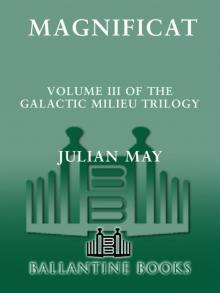 Magnificat
Magnificat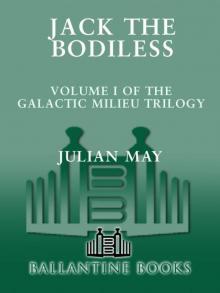 Jack the Bodiless
Jack the Bodiless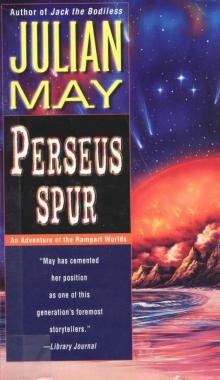 Perseus Spur
Perseus Spur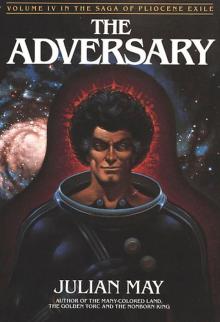 The Adversary
The Adversary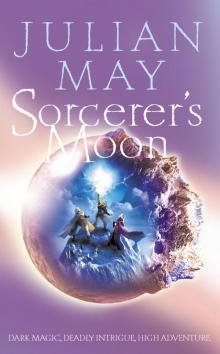 Sorcerer's Moon
Sorcerer's Moon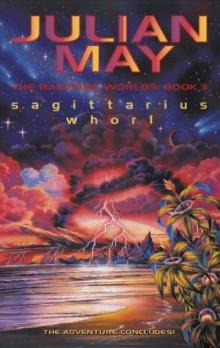 Sagittarius Whorl
Sagittarius Whorl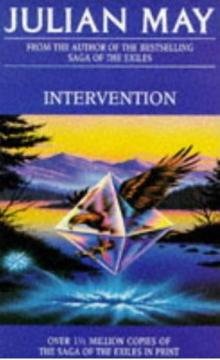 The Intervention (Omnibus)
The Intervention (Omnibus)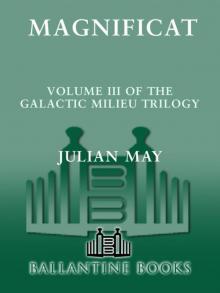 Magnificat (Galactic Milieu Trilogy)
Magnificat (Galactic Milieu Trilogy)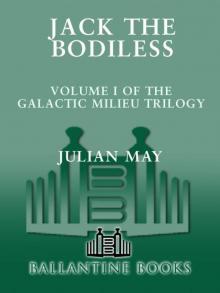 Jack the Bodiless (Galactic Milieu Trilogy)
Jack the Bodiless (Galactic Milieu Trilogy)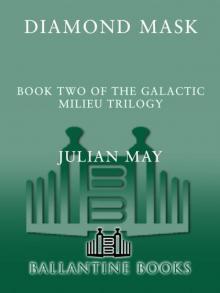 Diamond Mask (Galactic Milieu Trilogy)
Diamond Mask (Galactic Milieu Trilogy)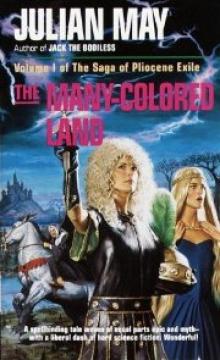 The Many-Coloured Land sope-1
The Many-Coloured Land sope-1